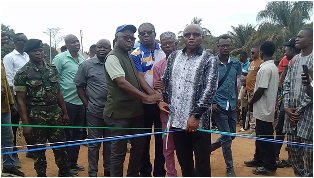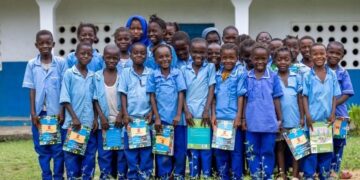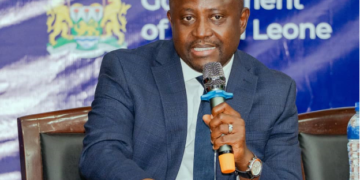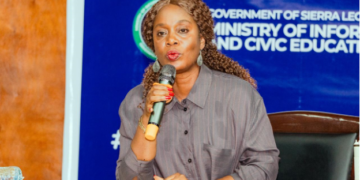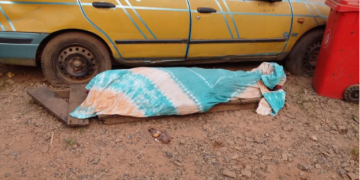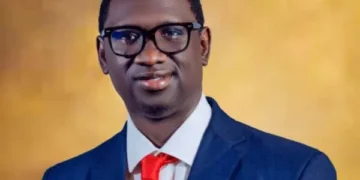By Jorjor Hitia Jormah, Chief Political Analyst & Senior Columnist
FREETOWN — As Sierra Leone hurtles toward the 2028 general elections, the All People’s Congress (APC) party finds itself at a historic crossroads: elect a flagbearer capable of not just uniting the party, but healing a fractured nation. Among the many seasoned politicians and rising stars vying for this mantle, one name quietly echoes with both reverence and resilience—Ambassador Omrie Golley.

This is not the echo of noise or self-aggrandizement, but of something deeper. A resonance born of diplomacy, sacrifice, scars of war, and an uncompromising belief in reconciliation.
The Quiet Peacemaker
Ambassador Golley is not your typical political contender. He carries no legacy of fiery partisanship or the hollow bravado of populism. Instead, his record reads like a statesman’s journal; deliberate, courageous, and deeply human.
In the early 2000s, at a time when Sierra Leone was drowning in the blood of its own civil war, Golley did the unthinkable: he became a bridge between the government and the Revolutionary United Front (RUF), not to excuse, but to engage – an act many saw as political suicide. Yet history may remember it as the gesture that nudged a war-weary militia toward peace talks and ultimately contributed to the end of one of Africa’s most brutal conflicts.
While others fled or stood on the sidelines of political safety, Golley walked into the fire, not with weapons, but with words.
Diplomacy in Action
As Sierra Leone’s Ambassador to South Korea, Golley swapped out the language of conflict for that of commerce and cooperation. He negotiated investments in infrastructure, facilitated aid during the Ebola crisis, and opened doors for Sierra Leonean exports—positioning the country on a firmer footing in Asia’s economic corridor.
His tenure wasn’t marked by headlines, but by outcomes. The construction of the Freetown City Hall, Korean medical personnel arriving during Ebola, and enduring bilateral relations are silent yet monumental testaments to his work.
Seeds of Sovereignty
But perhaps Golley’s most revolutionary work lies not in diplomacy or dialogue—but in the soil.
Through the Golley Agriculture Development Company, he has quietly established four agricultural innovation centers across Sierra Leone. While many politicians tout food security in manifestos, Golley has planted it—literally. His centers not only train farmers but introduce sustainable practices that reduce dependency on foreign aid and boost local economies.
In a country still struggling with self-sufficiency, this is more than policy—it’s empowerment.
A Message of Unity in a Season of Division
In a nation too often polarized along tribal, regional, and political lines, Golley’s campaign slogan—Forward Together—feels less like a tagline and more like a spiritual calling. He speaks of a Sierra Leone beyond the politics of vengeance and victimhood, one where our shared humanity eclipses inherited division.
His critics point to his past affiliation with the RUF peace process as a stain. But perhaps it’s time to ask: in a country desperate for reconciliation, do we punish the man who spoke to the wounded, or praise the one who helped stop the bleeding?
The Case for Golley
Golley is not the loudest. He may not be the most politically connected. But perhaps, in 2028, Sierra Leone doesn’t need noise or lineage. Perhaps it needs a restorer. A unifier. A man who has already proven he will go where others won’t—for peace, for dignity, for country.
His candidacy forces the APC to decide whether it will choose business as usual—or bet on transformation.
If the APC is serious about reinventing itself and not just winning elections, but healing a nation; then Omrie Golley may not just be a candidate. He may be destiny.
⸻
Jorjor Hitia Jormah is a Pulitzer-nominated journalist, technocrat, and political analyst based in Freetown and the United States of America. He specializes in African democracy, transitional justice, and post-conflict development.


